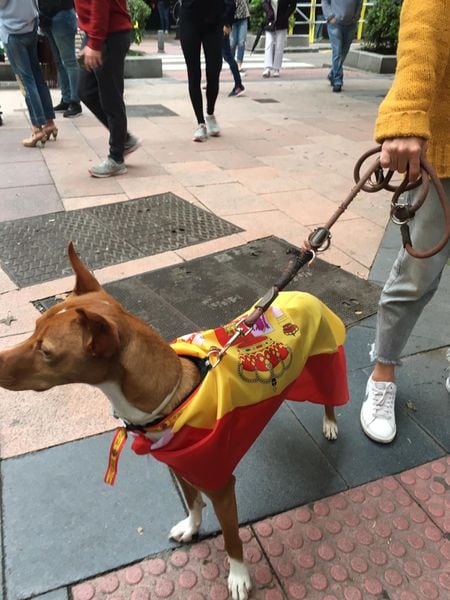RESIDENTS of Madrid’s upscale Salamanca neighborhood have
been making headlines since Sunday with a series of street protests
against the government over its handling of the coronavirus crisis.
Demonstrators
have been using the words “dictatorial” and “oppression” to describe
their situation under the ongoing lockdown. Madrid, the epicenter of the
coronavirus pandemic, is still in the early stages of a national deescalation plan that is expected to end in late June, if there are no new spikes in transmission.
The
protests reflect a view, held by some in Spain, that the state of alarm
introduced in mid-March to combat the coronavirus pandemic is really an
excuse for the central government to grab extra powers. Prime Minister
Pedro Sánchez, of the Socialist Party (PSOE), heads a minority
government and he has been facing growing difficulty to secure enough
congressional support for back-to-back extensions to the state of alarm.
The
sentiment mirrors similar feelings elsewhere in Europe, where
protesters from across the political spectrum are beginning to
demonstrate against prolonged confinement measures (see box below). A
recent report by Spain’s Civil Guard underscores the risk of social unrest in Spain if confinement measures are prolonged.
On
Wednesday, around 100 locals banged on pots and pans on Núñez de Balboa
street, without respecting social distancing rules. There were couples,
families and people with dogs. Some marched with face masks that had
tiny Spanish flags embroidered on them; others waved enormous flags
instead. The demonstrators called for the government to resign.
“I
pay my taxes and we have a government that is doing nothing,” said
María Jesús, 56, who was out with her husband Rafael, 60, and their son
Pelayo, 16. “That is why I am walking and protesting. You see these
gloves? I paid for them myself. And this face mask? I’ve paid for it,
too.”
“We’ve even had to pay for our own [coronavirus] test,” added her husband. “It cost me €80”
Wealthiest 1%
The
Salamanca district is named after a 19th-century marquis who was
instrumental in the area’s development. It is home to more than 150,000
people, including the wealthiest 1% in all of Spain and the wealthiest
3% in the Madrid region. Household income here is an average €50,376,
compared with €33,000 in the region and €28,417 in Spain.
Asun
(“I won’t tell you my surname, and you never ask a woman about her
age”) is a civil servant who has been protesting every day since Monday.
“You’d think we were criminals with so many police around. There is no
freedom. You should publish that [Pablo] Echenique and several other podemitas
live around here,eh?” she said, alluding to leading members of the
leftist Unidas Podemos group, which is the junior partner in Spain’s
coalition government.
“We are in a dictatorial system,
and I know what I’m talking about,” said Magdalena, a local resident who
works as a lawyer. “They are applying a decree that bans our freedom.”
The
demonstrations began on Sunday night. Several residents say that a
collective protest sprung up after several dozen youths gathered under
the balcony of an apartment that was blaring out loud music. Minutes
later, a police van showed up and handed out fines to 12 members of the
public for violating the lockdown rules. Several residents criticized
the police presence, crying out “Freedom!”
By Thursday,
however, the street protests had all but disappeared, with just a few
scattered people marching and chatting with reporters. One of them was
Laura Domínguez, 39, whose dog Barri wore a Spanish flag as a cape. “I
am here because I am sick and tired,” said Domínguez, wearing a face
mask and holding a cigarette. “They’re creating a country of idlers. And
now they want to take everything away from me.”

On Núñez de Balboa street, nearly 50% of residents voted for the conservative Popular Party (PP)
at the last general election, held in November 2019, followed by the
far-right Vox with 23%, the center-right Ciudadanos with 6.7%, and the
Socialist Party (PSOE) with 5.4%. The leftist Más País and Unidas
Podemos attracted less than 1% of the vote.
The regional
premier of Madrid, Isabel Díaz Ayuso of the PP, has been encouraging
these street demonstrations. “I hope people will go out on the street –
the events of Núñez de Balboa are going to seem like a joke then,” she
recently said. Meanwhile, Madrid Mayor José Luis Martínez Almeida, also
of the PP, said this week that “as long as [safety] conditions are
maintained, everyone is free to voice their opinion.”
Vox
leader Santiago Abascal has been pushing for anti-government
demonstrations and challenging authorities to ban them, arguing that
this would prove that fundamental freedoms are being violated. At a
recent session of Congress to extend the state of alarm, Abascal said
that his party would apply for permission to hold demonstrations against
the government on the streets of Spain’s main cities, but that in order
to respect social-distancing measures, the protests would be held
inside vehicles rather than on foot.
**************************************





1 comment:
The rich people so selfish everywhere in the world, old "franquistas" mixed with Vox party people. They are making noise...
Post a Comment